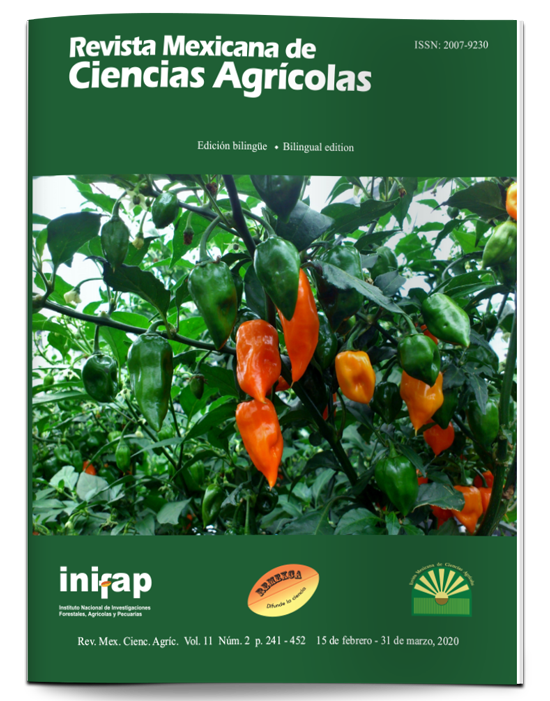Application of organic fertilizers in yield and root development in avocado cultivation
DOI:
https://doi.org/10.29312/remexca.v11i2.2301Keywords:
compost, fertilization, nutritional requirementsAbstract
Mexico is a world leader in the avocado market, participates with a production of 2 029 886 tons that represents 34.3% of the world volume produced, placing it in the first exported with 45.95% and with the highest per-capita consumption, with 10 kg per year). The yields per hectare are 10.1 t ha-1, which place it in fourth place worldwide (SAGARPA, 2017). The effect of a more leached compost of earthworm humus plus chemical fertilization on the root development and avocado yield was evaluated. In the experiment 3 levels of compost were applied: 100, 150 and 200 kg tree, accompanied by a conventional chemical fertilization proposed based on the nutrient diagnosis of the soil, which was 2 kg of the formula 20-10-05 per tree, plus 1.5 L of leachate in 60 L of water for each tree, equivalent to 300 L ha-1 per cycle. The control treatment consisted of a dose of only 2 kg per tree of the conventional formula 20-10-05 applied by the producer without the supply of organic fertilizers. The results indicated that the soil had a deficient level of Mn, low levels of N, Fe, Zn and B, an average level of Cu, while K and Ca were at high levels and N and Mg in excess. The superficial root development responded favorably to the treatments with application of organic fertilizers and had a direct correlation (p≤ 0.05) with the yield, as well as with the nutrient concentrations of Mg, Fe, Zn, Cu, B and organic matter obtained from sampling of soil of each treatment
Downloads
Published
How to Cite
Issue
Section
License
The authors who publish in Revista Mexicana de Ciencias Agrícolas accept the following conditions:
In accordance with copyright laws, Revista Mexicana de Ciencias Agrícolas recognizes and respects the authors’ moral right and ownership of property rights which will be transferred to the journal for dissemination in open access. Invariably, all the authors have to sign a letter of transfer of property rights and of originality of the article to Instituto Nacional de Investigaciones Forestales, Agrícolas y Pecuarias (INIFAP) [National Institute of Forestry, Agricultural and Livestock Research]. The author(s) must pay a fee for the reception of articles before proceeding to editorial review.
All the texts published by Revista Mexicana de Ciencias Agrícolas —with no exception— are distributed under a Creative Commons License Attribution-NonCommercial 4.0 International (CC BY-NC 4.0), which allows third parties to use the publication as long as the work’s authorship and its first publication in this journal are mentioned.
The author(s) can enter into independent and additional contractual agreements for the nonexclusive distribution of the version of the article published in Revista Mexicana de Ciencias Agrícolas (for example include it into an institutional repository or publish it in a book) as long as it is clearly and explicitly indicated that the work was published for the first time in Revista Mexicana de Ciencias Agrícolas.
For all the above, the authors shall send the Letter-transfer of Property Rights for the first publication duly filled in and signed by the author(s). This form must be sent as a PDF file to: revista_atm@yahoo.com.mx; cienciasagricola@inifap.gob.mx; remexca2017@gmail.
This work is licensed under a Creative Commons Attribution-Noncommercial 4.0 International license.



